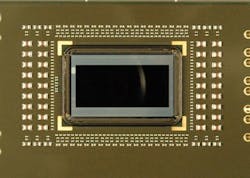Three small businesses chosen for $800 million DMEA ATSP4 SB program to fight electronics obsolescence
MC CLELLAN, Calif. – U.S. military microelectronics experts are choosing three small-business contractors for a potential $800 million 10-year program to fight the effects of electronics obsolescence and solve problems of unreliable, unmaintainable, under-performing, or incapable electronics hardware and software.
Officials of the Defense Microelectronics Activity (DMEA) in McClellan, Calif., announced contracts to the three companies Friday for the Advanced Technology Support Program IV (ATSP4) small business (SB) project.
The three ATSP4 SB contractors named Friday are RF Integration Inc. in Billerica, Mass.; a team of Alpha Research & Technology, Desert Microtechnology Associates Inc., and MicroNet Solutions Inc. JV in El Dorado Hills, Calif; and Teledevices LLC in Duluth, Ga.
These small-business companies will share as much as $800 million worth of orders over the next 10 years of potential ordering, DMEA officials say. Orders will support U.S. military technology and weapons development, as well as those of foreign militaries.
These contracts are for the smaller of two initiatives under the ATSP4 program. In the larger portion, DMEA chose eight major U.S. defense contractors in March 2016 for the potential $7.2 billion ATSP4 full and open competition.
Those eight contractors are:
-- BAE Systems Electronic Systems in Nashua, N.H.;
-- The Boeing Co. in Hazelwood, Mo.;
-- The Lockheed Martin Corp. Rotary and Mission Systems segment in Owego, N.Y.;
-- Cobham Semiconductor Solutions in Colorado Springs, Colo. (formerly Aeroflex);
-- General Dynamics Mission Systems in Minneapolis;
-- Honeywell Aerospace in Albuquerque, N.M.;
-- The Northrop Grumman Corp. Mission Systems segment in Linthicum, Md.; and
-- the Raytheon Co. Space and Airborne Systems segment in El Segundo, Calif.
The ATSP4 SB program is designed to resolve problems with obsolete, unreliable, unmaintainable, under-performing, or incapable electronics hardware and software.
Companies involved in this project will develop advanced technologies and applications to meet the requirements of the Department of Defense for a quick reaction capability.
Overall, the ATSP4 seeks to develop a quick-reaction capability to develop technologies necessary to keep a military systems operational, elevate their sophistication levels, and meet new threats.
ATSP4 orders may include developing components to meet the Pentagon's requirements for ultra-low volumes, extending component availability, or ensuring a trusted, assured, and secure supply of microelectronics.
The job also involves the quick application of advanced technologies to upgrade military weapons performance in response to traditional and irregular threats, as well as to the problems of aging weapon systems.
The ATSP4 program seeks to increase warfighter capabilities and solve electronics support problems like reliability, maintainability, and obsolescence by inserting advanced microelectronics into weapon systems.
The ATSP4 program covers hardware and software and includes studies, analysis, design, software, simulation, prototyping, integration, testing, producibility, and limited production.
On the ATSP4 SB program the contractors will do the work at their own locations. For more information contact RF Integration online at www.rfintegration.com; Alpha Research & Technology at www.artruggedsystems.com; Teledevices at www.teledevices.com; or DMEA at www.dmea.osd.mil.
Ready to make a purchase? Search the Military & Aerospace Electronics Buyer's Guide for companies, new products, press releases, and videos

John Keller | Editor
John Keller is editor-in-chief of Military & Aerospace Electronics magazine, which provides extensive coverage and analysis of enabling electronic and optoelectronic technologies in military, space, and commercial aviation applications. A member of the Military & Aerospace Electronics staff since the magazine's founding in 1989, Mr. Keller took over as chief editor in 1995.

